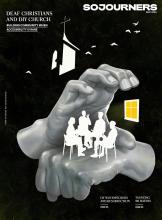IT'S AN IMPOSSIBLE task to write and offer a eulogy for one’s father. When a father dies — especially a good one — it’s like mountains crumbling, the sun going out, like a tsunami. There is life after all these things — but essentially a world is ending. It is catastrophic.
And yet. We also hold the ancient wisdom that we are made of ash and the breath of God and to ash and the breath of God we shall return.
John Henry Berger, son of Catherine Helena Gingrich and Henry Joseph Berger, has returned to ash and the breath of God.
While sorting through my Dad’s den, we found one file folder marked “funerals.” In it was a copy of a scripture passage that he had starred and highlighted. It begins, “Happy the one who has found a woman of worth. Her value is far beyond rubies. Her husband trusts her judgment; therefore he does not lack income. She brings him profit, not loss, all the days of her life.” In it we hear his humor and his wisdom. Even when he wasn’t acting out of his best self, he knew he had married Barbara Ely Bird, a strong-willed woman of worth, warmth, wisdom, and humor, one whose value is far beyond rubies or precious jewels. Dad loved Mom.
Read the Full Article

